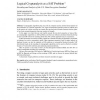Free Online Productivity Tools
i2Speak
i2Symbol
i2OCR
iTex2Img
iWeb2Print
iWeb2Shot
i2Type
iPdf2Split
iPdf2Merge
i2Bopomofo
i2Arabic
i2Style
i2Image
i2PDF
iLatex2Rtf
Sci2ools
144
click to vote
JAR
2000
2000
Logical Cryptanalysis as a SAT Problem
Cryptographic algorithms play a key role in computer security and the formal analysis of their robustness is of utmost importance. Yet, logic and automated reasoning tools are seldom used in the analysis of a cipher, and thus one cannot often get the desired formal assurance that the cipher is free from unwanted properties that may weaken its strength. In this paper, we claim that one can feasibly encode the low-level properties of state-of-theart cryptographic algorithms as SAT problems and then use efficient automated theorem-proving systems and SAT-solvers for reasoning about them. We call this approach logical cryptanalysis. In this framework, for instance, finding a model for a formula encoding an algorithm is equivalent to finding a key with a cryptanalytic attack. Other important properties, such as cipher integrity or algebraic closure, can also be captured as SAT problems or as quantified boolean formulae. SAT benchmarks based on the encoding of cryptographic algorithms can be...
Related Content
| Added | 18 Dec 2010 |
| Updated | 18 Dec 2010 |
| Type | Journal |
| Year | 2000 |
| Where | JAR |
| Authors | Fabio Massacci, Laura Marraro |
Comments (0)

